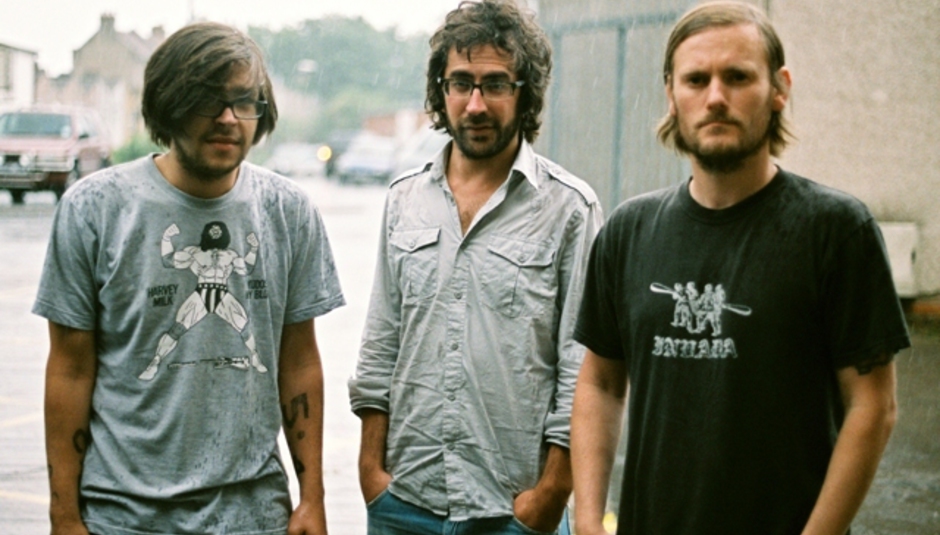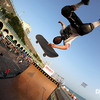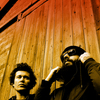Though received wisdom would have it that Geoff Barrow (pictured right, with BEAK>) spent the best part of 11 years – the gap between Portishead’s self-titled second album and last year’s mighty Third - tinkering with a drum loop or something, he’s always been busy with more than the ultra-gloomy don’t-call-them-trip-hoppers. Okay, probably he did spend 11 years tinkering with a drum loop, but during that time he ran off to Australia, produced all manner of bands, launched an art gallery and most notable of all, founded the Invada label, the low-key but exquitively-rostered home to the likes of Crippled Black Phoenix, Thought Forms, Fuzz Against Junk, Joe Volk, Gonga and Malakai. This weekend is Invada’s coming of age of sorts, as the label takes over Bristol’s Colston Hall for the Invada Invasion, an epic bill of music that takes in all the above acts, plus Fuck Buttons, Zu and the headlining Mogwai. BUT THAT’S NOT ALL. Oh no. All this week Invada invades DiS, for a week of content from its artists and acts playing at the concert. Why? Because we love Invada, because this gig looks amazing, and because for today’s first feature we get to talk to the delightful Mr Barrow himself, who discusses the gig, the label and his new band, BEAK>.
DiS: Hi Geoff. So in light of Mike Diver’s spiffy Invada label profile of last year, we’re not really going to talk about its history, so let’s just dive straight into the gig. You’ve always been quite a low key bunch; why did you decide to throw this big shindig?
Geoff Barrow: Several reasons really. One because the Colston Hall itself has always been known as kind of a dinosaur really, and it’s been kind of taken over by a guy trying to do some really good stuff with it. The trouble was that it was always related to Sir Edward Colston, who was a notorious slave murderer, basically, you know, part of the extinction of an estimated ten million Africans. So in that sense it’s not really something you want to associate with at first glance. But things are moving forward and y’know, hopefully they’re going to change the name next year. But with the venue re-opening [after a £20m extension and refurb] and the label being where it is and with some of the bands being a little bit bigger this year , Crippled Black Phoenix and a few other bands, they wanted an opening event, so they basically came to us and said ”here’s a load of dough”, and after seeing things like the success of Supersonic and being a fan of things like ATP, I thought ‘could this really happen in Bristol?’ So we are having a go!
DiS: Do you see it as in any way plugging the gap left by the Venn Festival?
GB: Well, I think Venn was a really brilliant ongoing festival, and this is kind of like a one off. At the moment there’s so much good music in Bristol that goes hugely unsupported. Bristol crowds are a bit strange in the sense of supporting each other, but Venn always did really well; I enjoyed Venn, and I know the Invasion can fill A gap.
DiS: Is Invada’s usually low-key approach an intentional stance?
GB: It’s just not having the money to do it, to be honest. It’s really just about trying to have acts that are diverse and that can generate their own marketing just through how good they are. Unless you’re going to drop thirty grand on a tour support and marketing and advertising it’s very hard to cut through, do you know what I mean? There’s so much music out there – good music – it’s just the nature of the beast that there’s the marketed side and the non marketed side.
DiS: Do you see yourselves as a ‘Bristol label’ as such?
GB: Invada in the UK is based in Bristol, but we’ll take anyone from anywhere really, given the chance, we’ll take anyone so long as they’re good.
DiS: There’s a sort of received wisdom that this is the Bristol music scene’s most fertile time since the mid-Nineties. Did it really get worse and then get better? Or is that just people getting fixated on trip-hop’s heyday?
GB: I think it is a better time now. I mean, when we started, it was just music being generated in little rooms, it was never really a scene as such because nobody hung out. I suppose now there is a hell of a lot better live scene, but it’s kind of similar to other cities, you know, you’ve got your haircut indie scenes, you’ve got your metal bands... I don’t think anything’s distinctly Bristolian apart from dubstep, I think that’s most probably the only pure Bristol thing that sounds like it comes from here.
DiS: Did you know Fuck Buttons from their Bristol days?
GB: No. Well. It was kind of weird because me and [Invada co-founder] Fat Paul were aware of them, and a friend of mine was like “have you heard of this band Fuck Buttons? Check them out”. And we kind of did but we were in this weird place with Invada, we kind of didn’t know if we wanted to carry on or not. But then we had a chat with Barry Hogan, because we were doing the ATP and he came down to Bristol and said “I’ve just signed Fuck Buttons” and I was like “oh, fucking hell”. And typically they go on to sell 40,000 records. But yeah, I’ve met ‘em, it’ll be fucking great to have them here.
And yeah, then Zu are playing, and I’m in this other band called BEAK> and we’re now label mates because we just signed to Ipecac so that’s cool, and obviously Mogwai, they have a connection because of Crippled Black Phoenix [Dominic Aitchison is in both bands], so the way I see it is kind of an extended sonic family really. The difference is that Zu, Fuck Buttons and Mogwai you’ve heard of before!
DiS: Were Mogwai the obvious choice to headline?
GB: Yes, but they were so big that we just didn’t know, we kind of didn’t know if we would have the budget to be honest, we looked at some other bands, but that wasn’t because we didn’t want Mogwai, but we were looking at costs like a quarter of that in our original budget. But then somebody said ‘if you want to go for Mogwai, go for Mogwai?’. So we did and they’ve been brilliant.
Video: BEAK>: 'Iron Acton'
DiS: So BEAK>. Do you write it like that so it looks like an actual beak?
GB: [pause] Yeah. Kind of, yeah. Um. We had a guy do us a logo and then I guess we put a beak on the end.
DiS: Riight. So there are three of you in the band [Barrow, Billy Fuller and Matt ‘Team Brick’ Williams] – but BEAK>’s stated rule is that you only record music with a live set up and under set time constraints. That would sound most obviously aimed at stopping you personally falling into the perfectionist hell of the Third sessions; fair?
GB: No; I think for all of us it was: ‘if we’re going to do this let’s just do this’. We’ve all been parts of processes of longstanding projects that have been drawn out, Matt with his album and Billy with a few projects. We enjoy jamming and we enjoy writing like this, so we should be able to do it. There’s been a lot of production involved in our previous records, and I think we wanted to do the opposite of that, because nowadays the production can be more important than the material, y’know, celebrity producers whatever. We were like ‘fuck it, let’s just make a record’.
DiS: Was there ever actually a conversation beforehand about what BEAK> would sound like or was supposed to be?
GB: No, we literally just went in and played, which was really, really nice. The other thing as well is that we wouldn’t tell each other what not to do, we just see what happens, we’re not precious about it. There are bits that I don’t like, but it’s not my band.
DiS: Have you devoted much thought to what you ended up with on BEAK>’s self-titled album? (due Oct 19) It definitely feels like much warmer music than Portishead.
GB: Um. I think that’s the thing, we haven’t really thought about it. A lot of time and thought goes into Portishead, but very little goes into BEAK>. Our sound is just a natural thing, it is what it is... it being warmer – I dunno, warmer colder, I don’t really know.
DiS: I suppose I mean it’s very analogue-y...
GB: Oh, yeah, it’s because some songs we literally played twice ever and that’s it, mistakes and everything else, if it’s got a vibe then that’s that, so in terms of analogue-y and less precise I think it’s a purely live playing whereas Portishead isn’t.
DiS: Presumably it’s not going to be too much of a stretch to play the whole record live, then?
GB: No, no, not really, no. With Portishead it’s this giant production, processed live drums, because we really aim for the sound of the record when we play live, whereas BEAK>’s this tiny set up and it shouldn’t be too much hassle. Same synths, same drums.
DiS: So you don’t need two PAs in a Portishead style?
GB: No, we’ll be lucky if we get one! It’ll be good getting back in the van.
DiS: You’ve got a van?
GB: Yeah, well I don’t think we’ll be playing 40 nights at the O2.
DiS: Some empty lots there at the moment
GB: There is a gap there.
DiS: Is there an element that BEAK> is kind of a laugh and may not prove a permanent thing?
GB: I take it deadly serious really, it progresses my brain when it comes down to writing and releases good stuff, and I think it does for everyone else, so I think in that sense there will still be more albums definitely. Because if we can still make it the way it was then it’s really not that much of a sacrifice to do it, 12 days in total.
DiS: So I spoke to a promoter who swore he was bringing Portishead to Poland next year.
GB: Ah. No.
DiS: Didn’t think it was likely.
GB: Yeah, unless he’s been sold somebody else pretending to be us. I am unaware at this point of any Eastern European dates.
DiS: Is Portishead on hold again?
GB: No, not at all, we’re going to start writing soon, we’re just working out what to do in the future, we don’t have a recording or publishing deal. We were signed to Island as a continuation of a Universal contract, but yeah, now we’re just meeting labels and just trying to work out which way to go forward.
DiS: Presumably you were fairly happy with the reception for Third?
GB: Yeah, I was incredibly happy, I was happier with the record than I was with the other two, worn out, but couldn’t really be any happier. You know people that are into music kind of really dug it and that’s always a good thing.






















